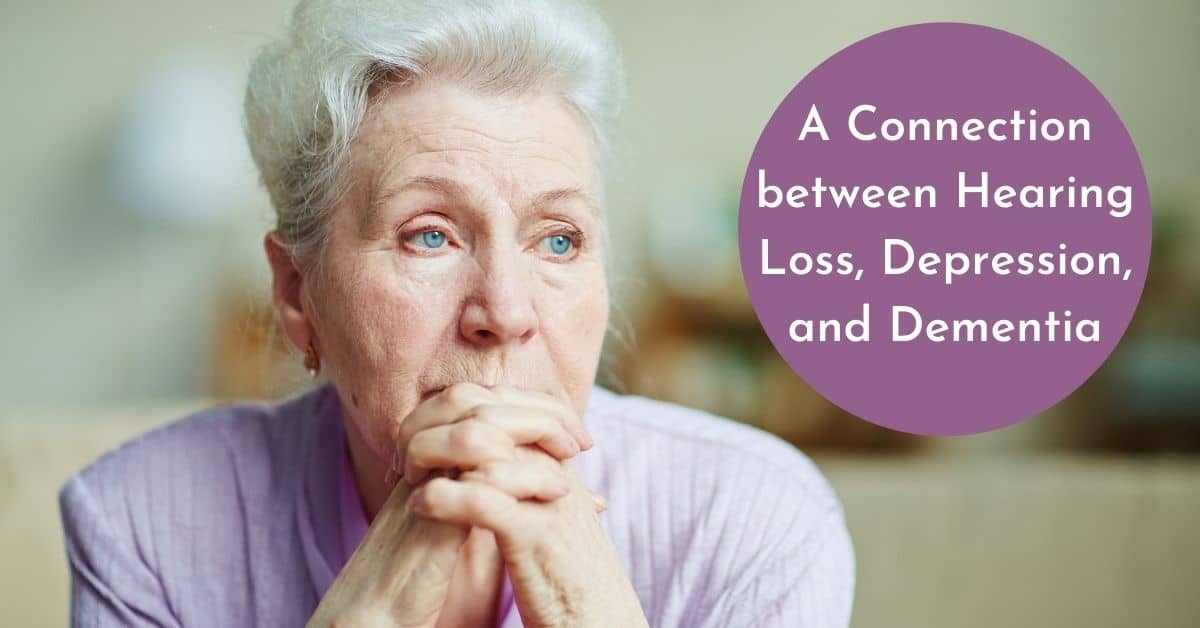Hearing loss affects many older adults all over the world. Around 1 in 3 people over the age of 65 have a hearing loss. That number rises to 1 in 2 people over the age of 75 who have a hearing loss. Despite these high numbers, many older adults don’t have hearing aids! Not only does hearing loss make it harder to follow conversations, hearing loss is also linked to depression and dementia. So treating hearing loss is even more important than you might think.
A Connection Between Hearing Loss, Depression, and Dementia
A study at the University of Michigan looked at the connection between hearing loss, depression, and dementia. All three of these conditions are common among older adults and the study wanted to see how they’re related. Untreated hearing loss increases your risk of developing both depression and dementia as you age. While hearing aids can’t completely prevent you from developing depression or dementia, the good news is that wearing quality hearing aids can reduce your risk of both these conditions.
Wearing Hearing Aids Can Make All the Difference
The study examined data from over 115,000 participants in the US who were all over the age of 66. All the participants had a hearing loss. Some wore hearing aids to treat their hearing loss, while others chose to live with untreated hearing loss. The researchers looked at data from 1 year before each participant was diagnosed with hearing loss. Then they tracked the data over the next 4 years to see if people with hearing loss have a higher risk of depression or dementia after their hearing loss diagnosis.
The researchers found that people with untreated hearing loss had several negative health outcomes. People with untreated hearing loss were more likely to receive a diagnosis of depression or anxiety in the years after their hearing loss diagnosis. They also had much higher rates of dementia than people without hearing loss.
Looking at the Numbers
This study also followed older adults who treated their hearing loss with hearing aids. Wearing hearing aids is associated with a number of positive health outcomes. This is what the researchers found when they looked at the data from 3 years after the hearing loss diagnosis:
- Wearing hearing aids reduces your risk of depression by 11%.
- Wearing hearing aids reduces your risk of a fall by 13%.
- Wearing hearing aids reduces cognitive decline.
- Wearing hearing aids reduces your risk of dementia or Alzheimer’s disease by 18%.
The numbers show that living with untreated hearing loss will increase your risk of depression and dementia. But what’s the connection?
What’s the Connection?
Depression: Hearing loss can make it difficult to connect with family and friends. You may have a hard time following conversations, and you might feel left out during social gatherings. Have you been asking people to repeat themselves? Have you pretended to hear what was said when really you didn’t hear the comment at all? People with hearing loss often struggle to stay connected with loved ones, and they feel socially isolated and alone. This increases the risk of anxiety and depression.
Dementia: Living with untreated hearing loss can affect the brain more than you realize. When you have hearing loss, you spend all your energy straining to hear what’s being said. You don’t have enough brain power left over to make sense of what’s been said, or perform other cognitive tasks. This listening fatigue can take a toll on your brain, increase cognitive decline, and increase your risk of dementia.
Why Treat Your Hearing Loss?
The study found that only 12% of people with hearing loss will invest in hearing aids! If you’re on the fence about treating your hearing loss, remember that treating hearing loss will reduce your risk of depression and even dementia. As you can see, wearing hearing aids can make a big difference in your overall health outcomes, and keep you happy and healthy as you age.
To find out more about your hearing health and how you can treat your hearing loss, schedule an appointment with us today! We’ll walk you through your treatment options and help you find the perfect devices that match your hearing needs and your budget.


